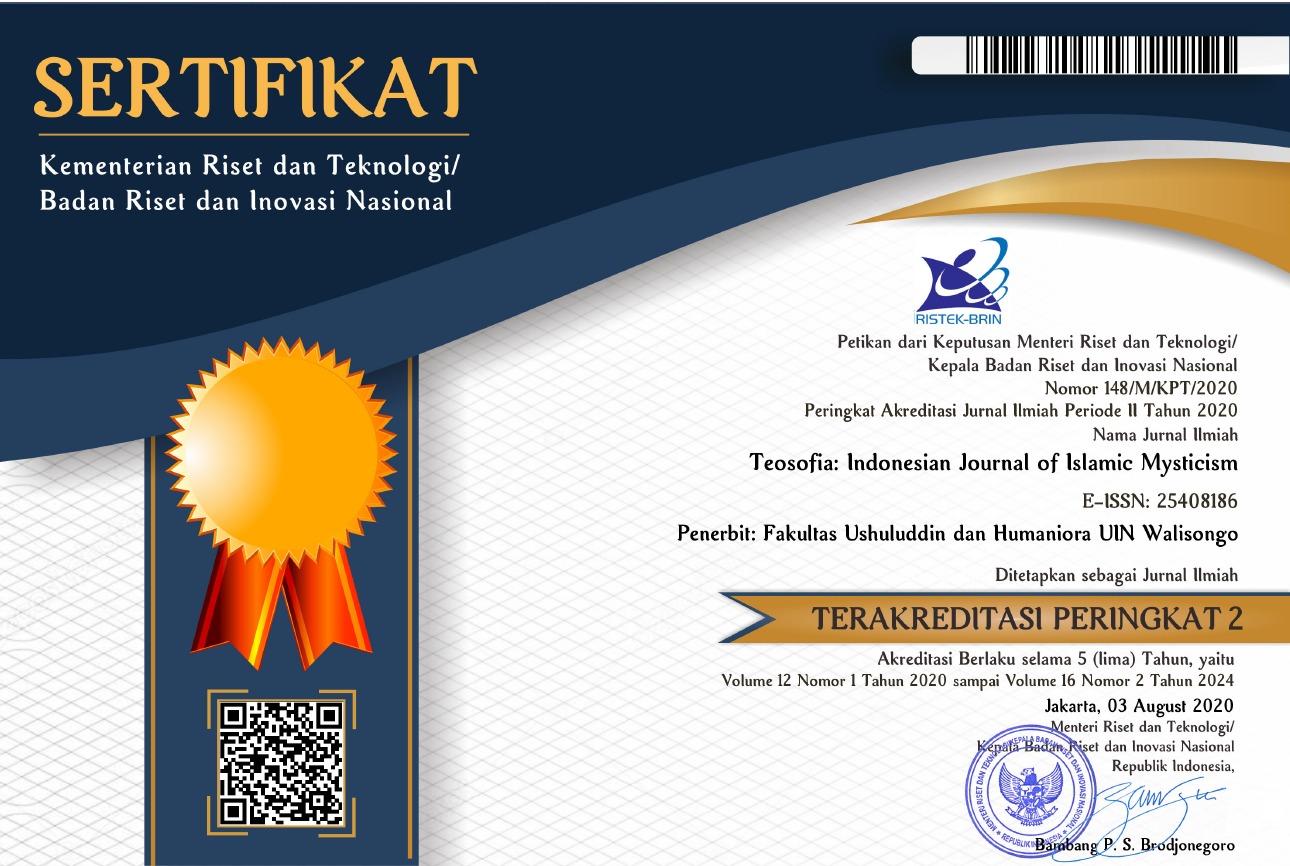Pancasilais Sufi: Kiai Asrori as a Portrait of Nationalist and Moderate Figure in Disruption Era
DOI:
https://doi.org/10.21580/tos.v13i1.20392Keywords:
Kiai Asrori, pancasilaist sufi, moderate, nationalist, disruption eraAbstract
The relationship between Islam and the state is still debatable in Indonesia. Pancasila, as the foundation of the state, is also often contested, even though it was formulated by the Indonesian founding fathers through a very serious academic debate. This study will examine the role of K.H. Ahmad Asrori Al-Ishaqi (hereafter Kiai Asrori) Kedinding Surabaya as a Pancasilaist Sufi. This is qualitative-based research, where the data were collected from Kiai Asrori's works and his lectures uploaded on YouTube, observations, and direct and indirect interviews. The findings show that Kiai Asrori is a Sufi who is able to demonstrate that there are similarities between the teachings of Sufism and nationalism, especially with Pancasila. Both even have a symbiotic association. Kiai Asrori is an ulama and a Sufi who upholds the values of nationalism and democracy, which are reflected in the Majelis Lima Pilar (Five Pillars Assembly) he established. This assembly was built on two foundations, namely the practice and teachings of Sufism and nationalism and democratic values.
Contribution: This study will provide new insights into Sufi practices and teachings that align with Pancasila values reflected in the figure of Kiai Asrori.
Downloads
References
Abdullah, Mukhammad. “Kontribusi Nilai-Nilai Keimanan Dan Kemanusiaan Persaudaraan Cinta Tanah Air Indonesia.” Teosofi: Jurnal Tasawuf Dan Pemikiran Islam 7, no. 1 (June 1, 2017): 249–72. https://doi.org/10.15642/teosofi.2017.7.1.249-272.
Akbar, M. Rais. “Sufi Nasionalis Dalam Al-Qur’an: Potret Intelektual Islam Nasionalis Berkepribadian Wasathiyah.” At-Turas: Jurnal Studi Keislaman 7, no. 2 (2020): 232–52. https://doi.org/10.33650/at.turas.v7i2.1518.
Ali, Muhammad. “Muslim Diversity: Islam and Local Tradition in Java and Sulawesi, Indonesia.” Indonesian Journal of Islam and Muslim Societies 1, no. 1 (June 1, 2011): 1–35. https://doi.org/10.18326/ijims.v1i1.1-35.
Arif, Syaiful. “Islam Dan Pancasila Pasca Reformasi: Pandangan Kritis Nahdlatul Ulama.” Tashwirul Afkar 38, no. 2 (2020): 193–212. https://doi.org/10.51716/ta.v38i02.30.
Asif, Muhammad, and Fakih Abdul Azis. “Al-Shaykh Maimoen Zubair wa Afkaruhu an Al-Islam wa Al-Wathaniyah wa Al-Tasamuh fi Indonesia.” JOURNAL OF INDONESIAN ISLAM 15, no. 1 (June 1, 2021): 223–46. https://doi.org/10.15642/JIIS.2021.15.1.223-246.
Aytðrk, İlker, and Laurent Mignon. “Paradoxes of a Cold War Sufi Woman: Samiha Ayverdi between Islam, Nationalism, and Modernity.” New Perspectives on Turkey 49 (2013): 57–89.
Badrun, Badrun, Sujadi Sujadi, Idi Warsah, Imron Muttaqin, and Ruly Morganna. “Pancasila, Islam, and Harmonising Socio-Cultural Conflict in Indonesia.” Al-Jami’ah: Journal of Islamic Studies 61, no. 1 (November 19, 2023): 137–56. https://doi.org/10.14421/ajis.2023.611.137-156.
Basya, Muhammad Hilali, and Hamka Hamka. “Cultural Capital, Islamism, and Political Distrust in Indonesia General Election: An Ethnicity-Based Community Engaged in Islamic Defenders Front (FPI).” Indonesian Journal of Islam and Muslim Societies 13, no. 2 (December 31, 2023): 253–77. https://doi.org/10.18326/ijims.v13i2.253-277.
Bindaniji, Muhamad, and Moh Ashif Fuadi. “Sufism and Religious Moderation in Counter Radicalism.” JURNAL ISLAM NUSANTARA 6, no. 1 (2022): 103–14.
Bogdan, Robert, and Sari Knopp Biklen. Qualitative Research for Education: An Introduction to Theory and Methods. 3rd ed. Boston: Allyn and Bacon, 1998.
Cardinale, Pamela, Muhammad Syaroni Rofi’i, Palupi Lindiasari Samputra, and Ramadhani Achdiawan. “Enculturated Education for Strengthening Character Education in Preventing Intolerance and Radicalism.” TARBIYA: Journal of Education in Muslim Society 8, no. 1 (June 20, 2021): 20–43. https://doi.org/10.15408/tjems.v8i1.20359.
Fachrurozi, Miftahul Habib. “Revolusi Demokrasi: Suatu Gagasan Memperbaiki Demokrasi Indonesia.” Mozaik: Kajian Ilmu Sejarah 8, no. 1 (2016): 49–68. https://doi.org/10.21831/moz.v8i1.10768.
Fairuz, Shofiyana Nadia. “INTEGRATIVE VALUES OF SUFISM AND NATIONALISM WITHIN SANTRI COMMUNITIES AT PONDOK PESANTREN DAARUL ULUM WAL ḤIKAM YOGYAKARTA (LEADERSHIP AND CHARACTER BUILDING ANALYSIS).” Teosofia: Indonesian Journal of Islamic Mysticism 7, no. 2 (December 21, 2018): 151–69. https://doi.org/10.21580/tos.v7i2.4402.
Habibullah, Muhammad. “KOSMOPOLITANISME DALAM BUDAYA ISLAM.” As-Shuffah 7, no. 2 (December 31, 2019): 18–24. https://doi.org/10.19109/as.v1i2.4859.
Hamdany, Robith. “Transformasi Kepemimpinan Kharismatik Menuju Demokratisasi.” Jurnal Politik Muda 1, no. 1 (2012): 1–13.
Ihsan, I., and Ahmad Fatah. “Pancasila and Islamic Education: The Deradicalization Model of Madrasahs Based on Islamic Boarding Schools in Central Java.” QIJIS (Qudus International Journal of Islamic Studies) 9, no. 1 (July 21, 2021): 245–78. https://doi.org/10.21043/qijis.v9i1.8941.
Irawan, Bambang, Rosmaria Syafariah Widjajanti, and Mohd Syahiran Abdul Latif. “The Practice of Sufism And Religious Moderation In The Kauman Pesantren Communities, Central Java, Indonesia.” Religia: Jurnal Ilmu-Ilmu KeIslaman 26, no. 1 (2023): 21–39.
Khalimi, Khalimi, and Abu Khaer. “Islamic Theological Perspective on Pancasila Textbook in Higher Education.” TARBIYA: Journal of Education in Muslim Society 7, no. 1 (September 23, 2020): 102–18. https://doi.org/10.15408/tjems.v7i1.16718.
M., Zulfa, Ananda Lisa P.S, and Agustya Panca P. “Demokrasi Indonesia.” Jurnal Kewarganegaraan, n.d. Departemen Teknik Universitas Airlangga. adm@ pih. unair. ac. id.
Masduki, Rifat. “Pemikiran KH Achmad Asrori Al-Ishaqy (Studi Atas Pola Pengembangan Tarekat Qadiriyah Wa Naqsyabandiyah Utsmaniyah Surabaya),” n.d. Accessed March 21, 2024.
Mudlofir, Ali, Hisbullah Huda, and Achmad Sultoni. “Nationalism and Pancasila Education within Indonesian Islamic and National Universities: Mapping Students Responses to the Integration of Spiritual and Emotional Intelligence-Based Education.” JOURNAL OF INDONESIAN ISLAM 15, no. 2 (December 1, 2021): 387–408. https://doi.org/10.15642/JIIS.2021.15.2.387-408.
Muhtar, Muhammad Zakki. “Moderasi Beragama dalam Kitab Tasawuf Al-Muntakhabāt karya KH. Ahmad Asrori Al-Ishaqi.” Jurnal Lektur Keagamaan 19, no. 1 (July 2, 2021): 269–306. https://doi.org/10.31291/jlka.v19i1.928.
Mu’ti, Abdul, and Ahmad Najib Burhani. “The Limits of Religious Freedom in Indonesia: With Reference to the First Pillar Ketuhanan Yang Maha Esa of Pancasila.” Indonesian Journal of Islam and Muslim Societies 9, no. 1 (May 24, 2019): 111. https://doi.org/10.18326/ijims.v9i1.111-134.
Muzakkir, Muzakkir. “TOLERANSI BERAGAMA DAN MAHABBAH DALAM PERSPEKTIF SUFI.” Jurnal THEOLOGIA 23, no. 1 (September 4, 2017): 125–39. https://doi.org/10.21580/teo.2012.23.1.1763.
Ni’am, Syamsun, and Anin Nurhayati. “Tasawuf Kebhinnekaan (The Sufism of Diversity) According to the Perspective of Indonesian Sufis: A Response toward the Problem of Diversity, Religiousity and Nationality in Indonesia.” International Journal of Philosophy and Theology (IJPT) 7, no. 2 (2019). https://doi.org/10.15640/ijpt.v7n2p1.
Nurhayati, Syamsun Ni’am & Anin. “Tasawuf Kebhinnekaan (The Sufism of Diversity) According to the Perspective of Indonesian Sufis: A Response toward the Problem of Diversity, Religiousity and Nationality in Indonesia.” International Journal 7, no. 2 (2019): 1–19. https://doi.org/10.15640/ijpt.v7n2a1.
Nurhuda, Abid. “Sufism Values in Pancasila as the Nation’s Ideology.” Athena: Journal of Social, Culture and Society 1, no. 3 (May 19, 2023): 102–7. https://doi.org/10.58905/athena.v1i3.53.
Octavian, Wendy Anugrah, and Puspa Dianti. “Nasionalisme Dan Pancasila Perspektif Sukarno.” Journal on Education 5, no. 3 (2023): 7553–62. https://doi.org/10.31004/joe.v5i3.1512.
Pattipeilohy, Stella Y.E. “Ketuhanan Yang Berkebudayaan: Memahami Pancasila Sebagai Model Interkulturalitas Di Indonesia.” Gema Teologika: Jurnal Teologi Kontekstual Dan Filsafat Keilahian 3, no. 2 (2018): 121–46. https://doi.org/10.21460/gema.2018.32.363.
Priatmoko, Sigit. “PENGARUSUTAMAAN NILAI-NILAI ISLAM MODERAT MELALUI REVITALISASI PANCASILA DALAM PENDIDIKAN ISLAM.” 2nd Proceedings; Annual Conference for Muslim Scholars, 2018.
Ridho, Ahmed Zaranggi Ar. “TAFSIR PANCASILA: REFORMULATION OF RELIGIOUS MODERATION.” Proceeding IConIGC: International Conference on Islamic and Global Civilization, 2021.
Setiawan, Zudi. “Peran Tokoh Nahdlatul Ulama Dalam Proses Perumusan Pancasila Sebagai Dasar Negara Republik Indonesia.” Spektrum: Jurnal Ilmu Politik Hubungan Internasional 18, no. 2 (2021): 80–95. http://dx.doi.org/10.31942/spektrum.v18i2.4800.
Sunoto, Sunoto. Mengenal Filsafat Pancasila. Yogyakarta: PT. Hanindita Graha Widya, 1995.
Tim Forum Kajian Ilmiah KLASIK. Nafas Sang Nabi: Menghayati Kehidupan Rasulullah Saw Dalam Beragama Dan Berbangsa. Kediri: Penerbit Lirboyo Press, 2022.
Vitorio et, al, Mantalean. “Catatan Tragedi Bom Thamrin: Direncanakan Di Penjara, Dieksekusi Residivis - JEO Kompas.Com.” Accessed March 19, 2024. https://jeo.kompas.com/catatan-tragedibom-thamrin-direncanakan-di-penjara-dieksekusi-residivis.
Wisudawan Mahasantri Ma’had Aly Lirboyo. Kritik Ideologi Radikal. Kediri: Lirboyo Press, 2018.
Downloads
Published
How to Cite
Issue
Section
License
Copyright
The copyright of the received article shall be assigned to the journal as the publisher of the journal. The intended copyright includes the right to publish the article in various forms (including reprints). The journal maintains the publishing rights to the published articles. Therefore, the author must submit a statement of the Copyright Transfer Agreement.*)
Licensing

This work is licensed under a Creative Commons Attribution-ShareAlike 4.0 International License.
In line with the license, authors are allowed to share and adapt the material. In addition, the material must be given appropriate credit, provided with a link to the license, and indicated if changes were made. If authors remix, transform or build upon the material, authors must distribute their contributions under the same license as the original.
_______
*) Authors whose articles are accepted for publication will receive confirmation via email and send a Copyright Transfer Agreement.








